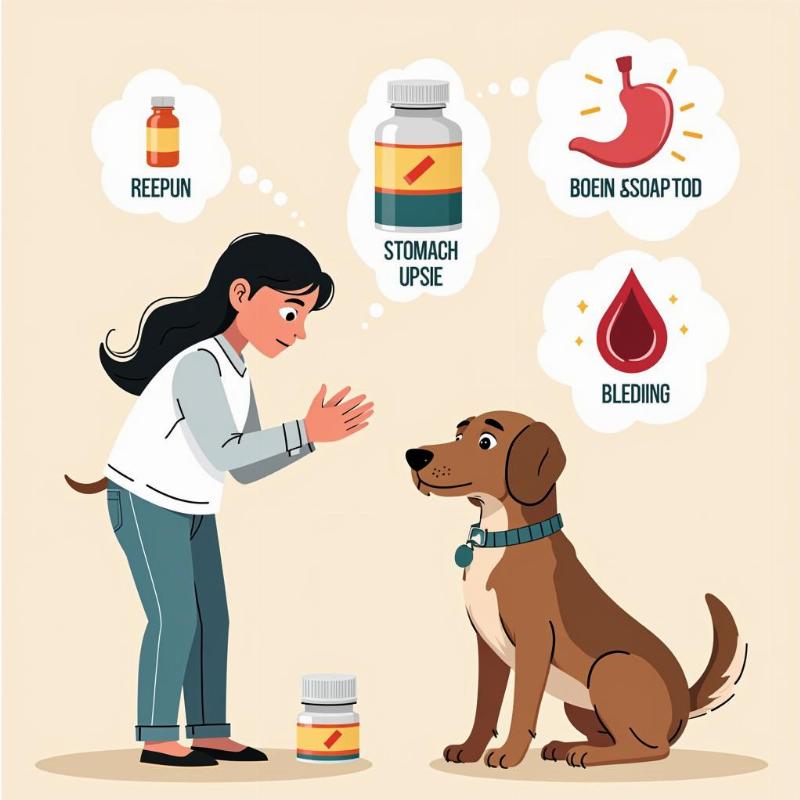Over the counter aspirin for dogs is a topic fraught with concern, as many pet owners wonder about its safety and effectiveness. While aspirin can be used in certain situations for dogs, it’s absolutely crucial to understand the potential risks, proper dosage, and when to seek veterinary care. Administering the wrong dosage or using aspirin in certain medical conditions can have severe consequences for your canine companion. This guide will provide you with the essential information you need to make informed decisions about using over-the-counter aspirin for your dog.
Understanding the Risks and Benefits of Over the Counter Aspirin for Dogs
Aspirin, also known as acetylsalicylic acid, works by inhibiting the production of prostaglandins, which are involved in inflammation and pain. While this can provide relief for dogs experiencing discomfort, prostaglandins also play a vital role in protecting the stomach lining and aiding blood clotting. This is why giving your dog aspirin without veterinary guidance can be risky. Gastrointestinal upset, ulcers, and bleeding disorders are potential side effects, especially with prolonged use or incorrect dosage.
 Risks of Using Over-the-Counter Aspirin for Dogs
Risks of Using Over-the-Counter Aspirin for Dogs
When is Over the Counter Aspirin Appropriate for Dogs?
Over-the-counter aspirin should never be your first line of defense for managing your dog’s pain. Always consult your veterinarian before administering any medication, including aspirin. They can diagnose the underlying cause of your dog’s discomfort and recommend the safest and most effective treatment plan. Your vet might consider aspirin for short-term pain relief in specific situations, such as osteoarthritis or musculoskeletal injuries. However, long-term use is generally discouraged due to the increased risk of side effects.
Safe Dosage of Over the Counter Aspirin for Dogs
Never guess the dosage! Only your veterinarian can determine the appropriate aspirin dosage for your dog, based on their weight, overall health, and the specific condition being treated. Using buffered or enteric-coated aspirin is generally recommended to minimize the risk of stomach upset. Even with veterinary guidance, closely monitor your dog for any signs of side effects, such as vomiting, diarrhea, loss of appetite, or lethargy.
When NOT to Give Your Dog Over the Counter Aspirin
Certain breeds, such as Greyhounds, are particularly sensitive to aspirin and other NSAIDs. Puppies and senior dogs are also at higher risk for adverse reactions. Never give aspirin to a pregnant or nursing dog. Additionally, avoid aspirin if your dog has a history of bleeding disorders, kidney disease, liver disease, or is currently taking other medications, especially steroids or other NSAIDs.
Alternatives to Over the Counter Aspirin for Dogs
Several safer and more effective pain management options are available for dogs. Your veterinarian might recommend prescription NSAIDs specifically designed for canine use, which offer better pain relief and a lower risk of side effects compared to over-the-counter aspirin. Other options include alternative therapies like acupuncture, physical therapy, or laser therapy.
Conclusion: Prioritize Your Dog’s Health and Safety
While over the counter aspirin for dogs might seem like a quick fix for pain, it’s essential to prioritize your dog’s health and safety by consulting your veterinarian. They can accurately diagnose the underlying cause of your dog’s discomfort and recommend the most appropriate treatment plan. Never self-medicate your dog with over-the-counter aspirin, as this can lead to serious health complications.
FAQs: Over the Counter Aspirin for Dogs
- Can I give my dog baby aspirin? No, do not give your dog baby aspirin or any other form of aspirin without consulting your veterinarian.
- What are the signs of aspirin overdose in dogs? Signs of aspirin overdose can include vomiting, diarrhea, loss of appetite, lethargy, seizures, and coma.
- What should I do if I suspect my dog has ingested too much aspirin? Contact your veterinarian or an emergency animal hospital immediately.
- Are there any natural pain relievers I can give my dog? Discuss natural pain relief options with your veterinarian, as some herbal remedies can interact with other medications.
- How can I manage my dog’s pain without medication? Your vet can recommend non-pharmacological pain management options, such as physical therapy or acupuncture.
- Is buffered aspirin safer for dogs than regular aspirin? Buffered aspirin can be gentler on the stomach, but it’s still essential to consult your veterinarian before giving it to your dog.
- How long does it take for aspirin to work in dogs? Aspirin typically takes effect within 30-60 minutes.
how to become a cadaver dog handler
Beautdogs.us is your premier online resource for all things dog-related in the US. We offer expert advice on dog breeds, care, and products, catering to both new and experienced dog owners. We are committed to providing reliable, comprehensive, and engaging information to help you build a stronger bond with your canine companion. Learn more about our services and products, or contact our team of experts at [email protected] or call us at +1 501-555-7529. Beautdogs.us is here to help you navigate the wonderful world of dog ownership.